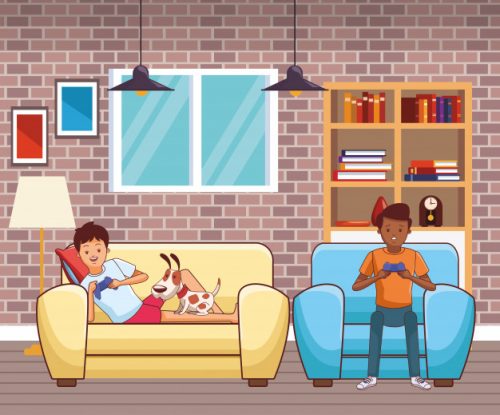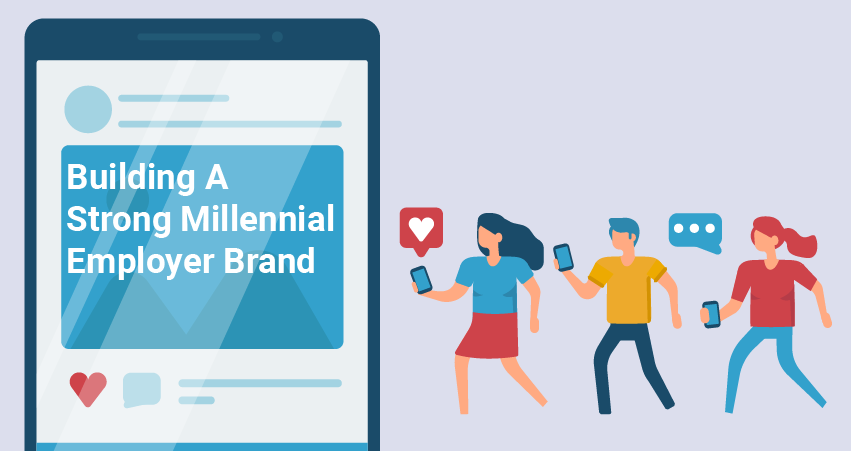In today’s tech savvy world, having a well-perceived millennial employer brand has become a must have feather in the hat of an organization that aims to lead.
Importance of Building Millennial Employer Brand
Building an employer brand for millennials requires you to market yourself as an innovator and a tech-friendly organization, with a culture that complements a workplace lifestyle that millennials strive for.
A growing concern for organizations is the pacing number of millennial candidates in the job market. One is compelled to ask, “How to attract special talent?”
Millennial Employer Branding: Innovation in Recruitment
For companies, it is a matter of completely remodeling their recruitment processes. But, why should they? Why cannot millennial candidates stick up with the processes that past generations followed?
Multiple researchers from Harvard Business Review and Pew Research Center offer some explanation.
The millennial candidate pool looks something like this:
Millennials identify as a generation that
- Sees life as a challenge and their objective is to “win the game”
- Stays up to date with technology
- Optimistic and confident about the future
- Indulges in maintaining connections with one another
- Wants to know the rules and fair rewards
- Always looking for constant feedback on their performance and consistent communication
- Is more likely to be attracted towards organized, structured, and planned out career prospects

Gamifying Assessments: Amplify Your Millennial Employer Brand
Organizations are developing dynamic recruitment strategies, methods and processes that sit well with the profile of these candidates.
Research and studies identify that one of the most effective methods is the implementation of gamification in recruiting millennial talent.
It simply refers to incorporating game design techniques, gaming mechanisms, and a gamer’s thinking potential to non-game contexts – recruitment process.
Employers can develop their millennial employer brand with gamified assessments. Since Millennials love to play games, companies can make use of gamification principles to bring gaming into their hiring process. The millennial talent finds game simulations as competitive, fair, engaging and more fun than any static written tests out there.
It also hands out rules to follow through and engage with constant feedback. All of this follows up in a structured environment built together by advanced technology, and that is something where this generation’s creative interests lie.
Examples of Good Millennial Employer Brands
Let’s breakdown typical game mechanics, most games are integrated with:
- Maps
- Quests
- Badges
- Leader boards
These are key aspects which can be applied to the recruitment process, career facilitation, and performance evaluations. This opens up an opportunity allowing participants to navigate towards what they like and what they are capable of.
Some of the big organizations that are “doing it right” when it comes to building their millennial employer brand are:
- Google: Google Code Jam is a fantastic example of how great millennial talent is attracted by allowing the programmers to compete in a coding competition and the winner is given a monetary reward along with the title of “The Champion”. The best coders are shortlisted and are then onwards assessed more for a given position.
- PwC: PwC used a multipoly 2-Round game to assess how interns would perform on the job by taking into account their performance on the game.
- Domino’s: Domino’s Pizza Mogul game allowed them to amplify their millennial employer brand by having candidates create their own pizza and earn badges as those pizzas would get sold. This gave out an excellent impression to the millennial candidate that Domino’s is a fun place to work for that appreciates creativity and are flexible with guidelines.
Rock-star Millennial Employer Brand:
Organizational socialization
A step that follows the orientation of new recruitments, filling paperwork, viewing presentations, reviewing contracts and documents, taking on tests, and attending on-the-job training.
It depends on organizations as to how do they create this orientation process. But the most important aspect here remains that it is a millennial candidate’s first impression of the company.

Gamified assessments have immense potential to replace such a course. A simple game where a player walks through a map progresses on levels, and earns points by attending presentations, meeting with institutional experts, and taking on group assignments. A gamified model would draw interest in the whole onboarding process thus building on the millennial employer brand.
Performance measure
Harvard Business Review asserts that millennials are moved by a democratic management style. A conventional performance measuring process grows into conflict with what the millennials actually aspire for. It clashes with their values, and as we close up on the generational draft, the current standards are going to be obsolete.
Gamified Psychometric Assessments can change that:
- By offering achieves via successful execution of projects, achieve a level of high problem solving with coworkers, participation in activities, training rounds, etc.
- By seeking acknowledgement from other members who give personal remarks on a candidate’s profile, their skills, and performance.
- By a formal recognition of completing tasks and job functions.

A proper game’s quest can create extensive reviews on a player’s performance. It would offer encouragement to those who have performed and at the same time, allow candidates to learn about their competencies. This easily eliminates the “subjectivity” of performance assessment, and a fair evaluation can be ensured.
All of this happens while getting our positive message across the millennials that we are here to empower them and to accelerate their progress, which in turn builds immensely on the millennial employee brand.
Career growth
Developing a career growth model can be done using the same principles of gamification. Traditional approaches find an employee learning the feedback of their supervisor or manager to devise plans regarding their development goals in their career. This is a process that rewards career progression in a linear form. You get rewarded for your merit and skill.
However, this is not the right fit for millennials. It implies that linear growth is the only metric to ensure career growth. It also means that monetary compensations are the primary source of motivation. Millennials rather value job enrichment and values alike over an increase in salaries.
To build on one’s millennial employer brand, self-direct simulations should be incorporated in the game, so it provides players with a chance to progress along their path on a full map. This also offers a structure that is important for giving flexibility and margin of choice.
Such independence would mean freedom to self-direct one’s career, and to navigate forward using one’s potential, strengths, and skills. Such a set of values will let them attain mastery through a demonstration of one’s competencies.
Powerful Tips to Becoming a Millennial Employer Brand
Make it brand specific
A generic assessment will mean your organization’s model is no different than competitors. Generic solutions are adequate for short-term benefits. They have no relevance in the longer run and would only incur damages. If you really want to accelerate the process of building on your millennial employer brand, the whole assessment should feel like it relates to your brand and carries your workplace environments and organizational values.
Adopt clarity
Gamified assessments are developed for a plethora of objectives. It could be recruitment, pre-screening candidates, or on-job evaluation.
Make an assessment on the basis of your clear objective. The objective should be incorporated at all points, from the beginning till the end.
Define your objective first. Move on to making it clear what you wish to achieve from the assessment. You could choose to assess critical thinking skills, cognitive abilities, resistance to pressure, collaboration and team work, participation, response time, attention to detail, creative potential, and many more.
At the same time, determine exactly what aspects need to come together and developed in order to achieve these objectives. A clear approach allows candidates to build their own understanding about the whole process that they have signed up for.
Refined experience
Your candidates are more likely to give accurate answers if they feel the need to do so. Assessments based out of Artificial Intelligence should be interesting. Immersive experience, attractive visuals, and accurate demonstrations of gamified scenarios should be fundamental aspects.
The time frame of playing games should also be a considerate amount. The assessment rounds must aim to offer a unique and thrilling experience, without having to go beyond the validated psychometric principles.
Leveraging Social Media
Candidates are active on social media and like to give opinions on activities they are taking on. If they do not enjoy or find the experience “mind-numbing” or a lackluster, they would not hesitate speaking about it on social media. A bad review can be detrimental to your goals and thus pulling down your millennial employer brand.

Game-play dynamics and compatibility
Organizations must always make sure the assessments that are gamified must be compatible with all devices and operating systems. The interface and display must appropriate designed and stay compatible with multiple device ranges.
Any elements of text, audio, images, animations, etc. must be sized appropriately and function normally. Candidates must not be under the impression that they can only perform best if use the program on iOS.
Stay up to date
Millennials are a demographic that demands more. Their expectations are always high and as a business, you are required to meet their specific set of expectations accurately. No AI based assessment is worth investing and developing if it does not match with the criteria.
No technological assistance can perform well unless an efficient user interface and attractive design is incorporated.
No psychometric assessments tools are worth unless candidates feel comfortable to engage.
Your millennial employer brand should put forth an experience that offers:
- Trust
- Accountability
- Engagement
- Accessibility
- A chance to have fun
You may incorporate the best catchphrases or design copies, but if they were not put together by attractive visuals or the right context, they would be doomed to failure.

Bottom Line
Effective millennial employer branding is crucial for businesses. Companies face a lot of challenges in recruiting and retaining top millennial candidates.
A company’s human resource (recruitment) department is faced with the task of setting their sights beyond the parameters of conventional recruitment practices. Of course, results cannot be achieved unless cooperation, assistance, and support from all departments of an organization are sought.
Companies can remodel their recruitment policies and structure by not losing touch of essential traditional aspects but mold them into gamified structures.
It is an effective and engaging way to draw the interest of millennial candidates who are set to thrive in the job market in the following years. These complexities also mean an organization can gear towards the keen objective sought by their ideal candidates: winning the game.
